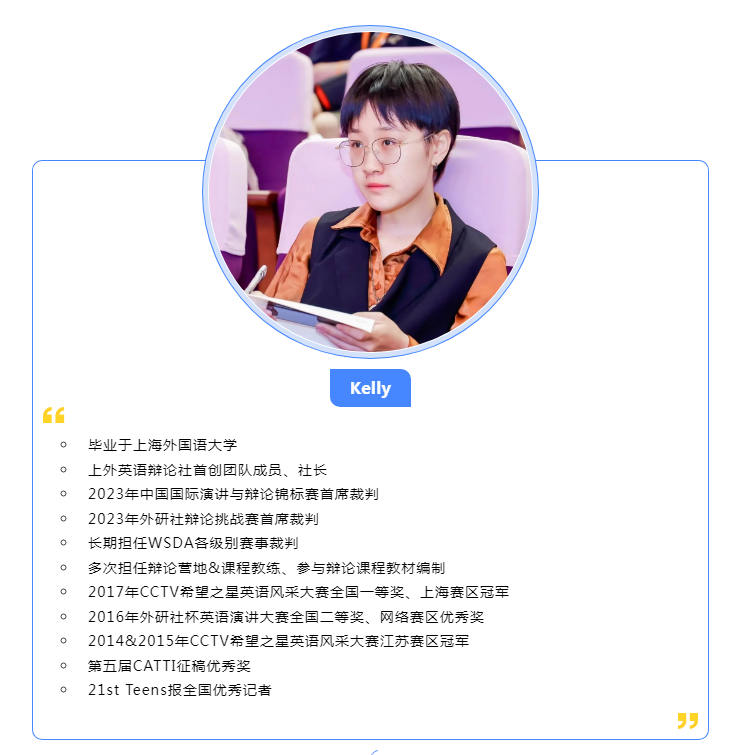各位演讲者&辩手们:
WSDA 2024春季活动即将在本周末拉开帷幕!为了能帮大家更好的备战接下来的比赛,小编倾情推出了“WSDA裁判说”系列推文。这个系列将从资深裁判或教练的视角,为大家不定期放送与演讲&辩论有关的干货!
另外,2024 WSDA春季活动公共论坛式辩论材料包已上线!各位辩手们可以前往【WSDA云课堂-会员中心-登录账号-首页-辩题材料】领取你们的通关助力宝典啦!
第一期“裁判说”,小编为大家邀请到了我们的老朋友Kelly,带着她对于春季公共论坛式辩论辩题的见解为你助阵!正紧锣密鼓备赛的辩论人们,快速速码住这份宝藏资料吧!

Resolved:
"Education systems in OECD member countries
should prioritize vocational training
over traditional academic curriculum."
面对任何一个辩题,精准解题都是第一步。我们首先需要定义好辩题中的每个关键词:
01 OECD
经济合作与发展组织,由38个市场经济国家组成。大家需要注意:中国不属于Member Country。
Formed by 38 countries in Europe, the Americas, and the Pacific: Australia, Austria, Belgium, Canada, Chile, Colombia, Costa Rica, Czech Republic, Denmark, Estonia, Finland, France, Germany, Greece, Hungary, Iceland, Ireland, Israel, Italy, Japan, Korea, Latvia, Lithuania, Luxembourg, Mexico, Netherlands, New Zealand, Norway, Poland, Portugal, Slovak Republic, Slovenia, Spain, Sweden, Switzerland, Turkey, United Kingdom, United States.
参考网址:https://www.oecd.org/
02 Education Systems
广义的涵盖了学校、教师、课程等和教育相关的内容。
03 Prioritize
合理的把握什么是“优先”很重要:辩手们需要做的更多是对两种教育模式进行比较,而不是仅仅就一种模式进行输出。
It doesn’t mean the countries ONLY provide vocational training or traditional academic curriculum, but only to emphasize either one of them.
04 Vocational Training
根据经合组织官网的定义:Vocational Education and Training (VET) ensures skills development in a wide range of occupational fields, through school-based and work-based learning. It plays a key role in ensuring lower school dropout rates and facilitates the school-to-work transition. In a changing world of work, well-designed VET systems can play a crucial role in developing the right skills for the labour market, not only for youth but also for adults in need of up-skilling or re-skilling. The OECD VET and Adult Learning Team helps countries understand the main strengths and weakness of their VET systems, and identifies opportunities and challenges for future-ready VET systems that are resilient, flexible and inclusive.
参考网址:https://www.oecd.org/education/innovation-education/vet.htm
05 Traditional Academic Curriculum
传统自然学科、语言学科、社会学科等内容。
PROS
Prioritize Vocational Training
01 降低失业率
失业率高居不下将为政府增添更多压力,政府需要发放更多失业救济,同时,失业人数增加容易滋生对政府不满的负面情绪,影响社会安定。
The OECD unemployment rate was stable at 4.8% in December 2023. In 2023, the number of unemployed persons in the OECD continued to decline for the third consecutive year, reaching 33.2 million, the lowest annual level since 2001. In the European Union and the euro area, the unemployment rate remained at record lows of 5.9% and 6.4%, respectively.
In December 2023, the OECD unemployment rates for women and men were broadly stable, at 5.0% and 4.7%, respectively. The same holds for younger workers (aged 15-24) and those aged 25 and above. The youth unemployment rate recorded the largest increases in Austria, Czechia, Iceland, and Sweden. Youth unemployment rates close to or above 20% were recorded in 10 OECD countries.
Outside the European OECD countries, unemployment rates in December 2023 were stable or increased. The largest rises were recorded in Colombia and Korea.
参考网址:https://www.oecd.org/sdd/labour-stats/unemployment-rates-oecd-updated-february-2024.htm
02 更好地面对错综复杂的未来环境
后疫情时代对于工作的需求产生更多变化,面对线上、远程、AI等新需求,每位教育者和工作者都将面临更新的教育及工作内容。
Employers play a crucial role in lifelong learning by providing continuous professional training and informal learning at the workplace as well as in engaging in social dialogue about the purpose, relevance, and substance of education. Moreover, employer engagement is at the heart of effective career guidance for young people, amplifying labor market signaling and enabling progression towards attractive employment.
The blurring of the clear line between acquiring knowledge and skills (in educational institutions) and applying them (in society and workplaces) is an opportunity to make learning more relevant, authentic, and engaging. For formal education in educational institutions, such as schools and universities, increased collaboration with other actors in society offers an important avenue for re-inventing themselves, which has potential for significant benefits to learners.
The digital transformation and AI will force further redefining the skills needed for human learning and development. Currently, there is also a lack of AI skills among the workforce, which is a major challenge for the adoption of AI in society.
参考网址:https://web-archive.oecd.org/2022-11-30/618066-future-of-education-brochure.pdf
Sub Point A: Digitalized Work
数字化时代下的工作,这类学习内容并没有被包含在传统学科中,但在今天的社会已经越来越常见了,不进行此类培训将很大程度上影响大家的工作。
Sub Point B: AI
AI的兴起也显然不被包含在传统学科中,有新闻称AI早已通过图灵测试,对于AI的了解和学习显然也变得更加重要了。
Sub Point C: Mobility
城市之间的人员流动以及国家之前的流动更加频繁,关于各地文化及当地市场的认知显然也不被传统学科包含。
CONS
Prioritize Traditional Academic Curriculum
01 教育的不公平
过分侧重职业教育将剥夺许多人接触平等教育资源的机会。
It should also be acknowledged that education can amplify inequality when educational opportunities are not fairly distributed within societies.
参考网址:https://web-archive.oecd.org/2022-11-30/618066-future-of-education-brochure.pdf
更多贫苦年轻人将因为生计不学习传统学科而直接进行技能培训,一定程度上影响了学生未来发展和个人选择。且学习内容的分化导致各阶层认知产生极大变化,从而使的通过接受教育跨越阶层更加困难,造成社会阶级固化。The rich get richer, the poor get poorer.
02 基础学科和工作技能的关系
复杂的工作需求都来源于基础学科的组合,不学习基础学科将难以理解复杂的工作要求。且万事万物的构成方式都有相似性。
03 社会构造&文化传承
AI的兴起和科技的进步将对社会构造做出改变,人们不一定还需要传统意义上的“工作”。“工作”的技能很容易被科技取代,而人类文明和精神才是人类社会的核心。
职业化教育将弱化文化及基础知识的重要性。然而,传统学科之所以传承人类千年历史而不被淘汰,论证了思维方式和基础思想才是任何学科及未来创造的根本。上述双方的观点供辩手们参考,包括但不仅限于以上观点哦~
总而言之:
PRO可以更多的强调工作的重要性,以及目前社会中对工作能力的需求。
CON可以更多从人文角度出发,论证传统学科的范围和意义。
关于每个观点的具体数据论证,还请各位辩手发挥你们惊为天人的搜索能力,为每个观点的warrant和impact添砖加瓦吧!
如果有任何feel lost的时候,记得去看看OECD官网中的海量资料,以及多多去dig一下这38个国家的国情数据哦!
本期“裁判说”,Kelly老师就为大家抛砖引玉到这里啦!
祝大家都能在即将到来的春季赛中赛出风采,收获满满!
END
免费留学评估




